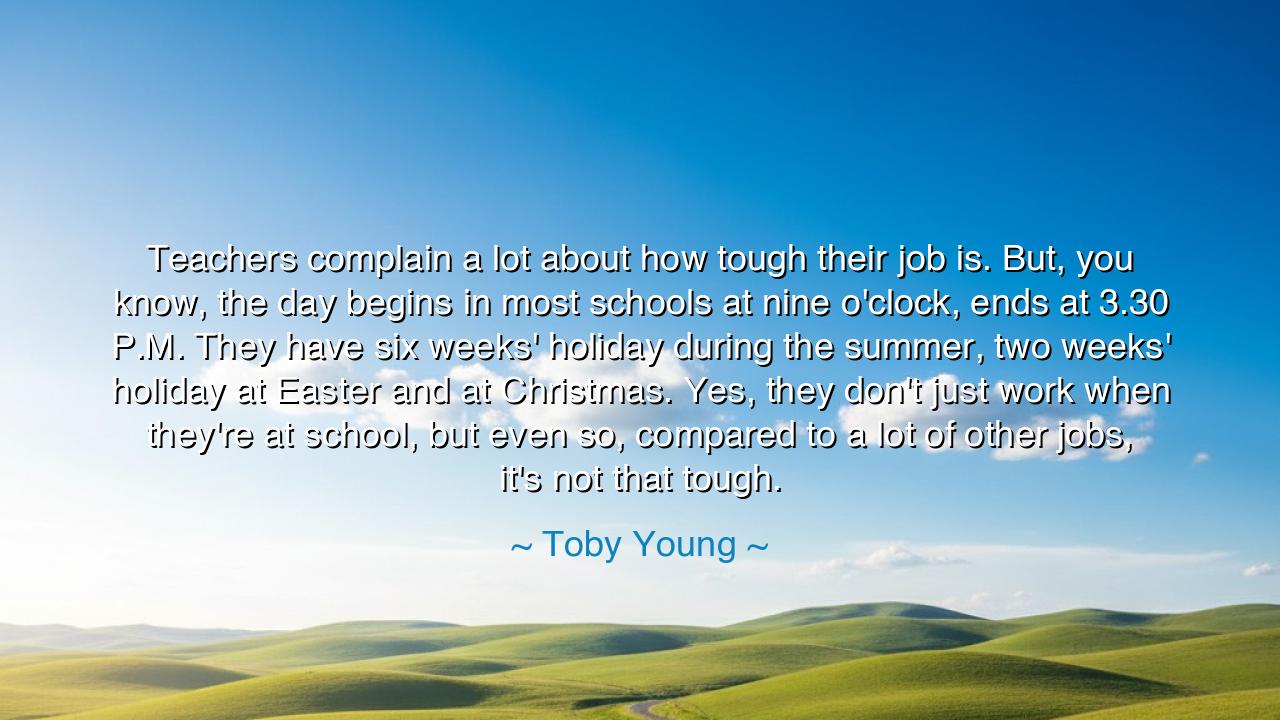
Teachers complain a lot about how tough their job is. But, you
Teachers complain a lot about how tough their job is. But, you know, the day begins in most schools at nine o'clock, ends at 3.30 P.M. They have six weeks' holiday during the summer, two weeks' holiday at Easter and at Christmas. Yes, they don't just work when they're at school, but even so, compared to a lot of other jobs, it's not that tough.






When Toby Young remarked, “Teachers complain a lot about how tough their job is. But, you know, the day begins in most schools at nine o’clock, ends at 3:30 P.M. They have six weeks’ holiday during the summer, two weeks’ holiday at Easter and at Christmas. Yes, they don’t just work when they’re at school, but even so, compared to a lot of other jobs, it’s not that tough,” he spoke words that provoked much debate — words that question the nature of labor, vocation, and the unseen burdens that come with service. Beneath the surface of this statement lies a challenge that every society must confront: how do we measure difficulty? By hours alone, or by the invisible weight of the human spirit?
The origin of this quote comes from Toby Young’s long-standing career as a journalist and commentator, known for his often provocative remarks about education and public service. He was not attacking teachers personally, but rather stirring conversation about the perception of labor — how some professions, cloaked in reverence, might still require scrutiny when compared to others. Yet, like all such observations, the truth of his words lies not in their bluntness, but in the questions they awaken. For though he speaks of timetables and holidays, what he truly touches upon is the eternal debate between work as duty and work as devotion.
To the ear untrained in nuance, Young’s comment may seem dismissive. Yet to the reflective mind, it opens the deeper inquiry: what is the measure of a teacher’s labor? For the teacher’s work cannot be counted in hours or holidays. It extends beyond the ringing of the school bell, beyond the lesson plan and the report card. A teacher’s true labor is the shaping of minds, the nurturing of curiosity, the awakening of souls — work not done by hand, but by heart. And though the physical day may end at 3:30, the echoes of their effort continue long after, carried in the thoughts and lives of the young.
In the ancient world, the teacher held a place akin to the philosopher, the priest, and the craftsman combined. Socrates wandered the streets of Athens, teaching without pay, challenging his students not to memorize facts but to confront truth. His “hours,” too, may have seemed light to those who judged by schedules, but his work cost him his freedom and his life. Likewise, Confucius, traveling from kingdom to kingdom, endured rejection, hunger, and exile for the sake of teaching virtue. Neither man would have measured his labor in time, for the true teacher’s work is not toil of the body but of the spirit — a struggle with ignorance, indifference, and despair.
Yet Young’s words remind us of something else: that perspective shapes our understanding of hardship. The laborer who digs, the nurse who works through the night, the soldier who faces battle — all may look upon the teacher and wonder if their struggle is equal. And perhaps, in one sense, they are right. Every profession has its own weight, its own fire to endure. The teacher’s hardship may be quieter — not the strain of the muscle, but the erosion of patience, the endless striving to reach hearts that may not listen. The laborer sweats in the sun; the teacher bleeds in silence. Both are difficult in their own way.
Thus, the wisdom to be drawn from Young’s statement is not found in judgment, but in understanding. It teaches us that one must not compare the burdens of different callings with careless eyes. For every path of work — be it of the hand, the mind, or the soul — bears its own form of fatigue. To measure another’s difficulty by outward appearance alone is to miss the inner dimension of human effort. The wise learn to respect all forms of labor, knowing that society itself collapses when any one is undervalued.
And so, the lesson to carry forward is this: speak with awareness, and work with empathy. If your task seems lighter than another’s, let gratitude, not pride, guide your heart. If your toil feels heavier, let understanding temper your judgment. For in the grand order of human life, every role — teacher, builder, healer, or leader — is a thread in the same tapestry. Remove one, and the pattern fails. As Toby Young’s words remind us, perhaps unintentionally, it is not the ease or difficulty of the work that defines us, but the purpose for which we endure it.






AAdministratorAdministrator
Welcome, honored guests. Please leave a comment, we will respond soon